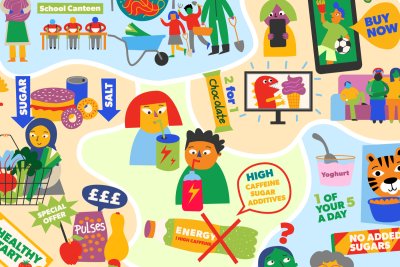UK government must ‘face the facts’ on household food insecurity
Food and poverty organisations and MPs are calling on government to measure household food security as part of new British food and farming legislation.
The government is planning to introduce a legal requirement to measure and report on "food security", meaning how much food is available in the UK. However, their definition fails to consider if everyone in the UK is able to access or afford the food available.
Kath Dalmeny, chief executive of the food and farming charity Sustain [1] said:
“Year after year, charitable food banks have stalwartly provided evidence of the gigantic increase in the number of our fellow citizens regularly running out of money and food. Teachers tell us of children in their class struggling because they are going hungry. Local authorities are cancelling meals on wheels services because of savage cuts to their budgets. The idea that government would fail to routinely measure and take action to solve these problems is appalling. They need to face the facts.”
Anna Taylor, chief executive of the Food Foundation [2] said:
“For too long, the problem of food insecurity which affects children and adults in all corners of the UK has been overlooked. It leaves life-long scars on health and wellbeing. Now we have a chance to ensure parliament receives regular reports on the scale of the challenge so measures can be put in place to tackle it. This is a real opportunity to begin the end of this scourge on our society.”
Emma Lewell-Buck MP [3] has tabled an amendment to the draft Agriculture Bill, seeking inclusion of household food insecurity in this new legislation [4,5]. She said:
“We are seeing devastating levels of hunger right across the UK. The Government have been dragged kicking and screaming into agreeing to measure food insecurity, however there is no commitment in legislation that the measurement will continue for future years, nor that the results of the survey they are conducting will be laid before Parliament for scrutiny. When hospital admissions for malnutrition are increasing and food banks are running out of supplies. It is clear urgent action is needed. To keep ignoring this issue is a shameful dereliction of duty.”
Sabine Goodwin, Coordinator of the Independent Food Aid Network, the UK network for independent food aid providers, said:
"We very much welcome the DWP's inclusion of food insecurity measurement questions into the Family Resources Survey but this breakthrough and the duty to report on the survey results must be enshrined in law. The growing food insecurity crisis, extending far beyond food bank figures, and the poverty that drives it have been ignored for too long by the Government. Food banks and other food aid providers cannot be left to continue to pick up the pieces and distribute increasing numbers of emergency food supplies. We need the Government to commit to regular food insecurity measurement and to resulting data being scrutinised."
Dan Crossley, Executive Director of the Food Ethics Council, a charity providing independent advice on food and farming ethics, said:
“We at the Food Ethics Council strongly support the need to measure household food insecurity on a consistent and regular basis. It’s important to enshrine this in law through the Agriculture Bill. This will allow everyone to track how many are food insecure and to hold the UK Government to account. We want everyone to be able to participate in shaping our food systems for the better, and everyone to have access to enough nutritious, culturally appropriate food.”
Rachel Loopstra, Lecturer in Nutrition at King’s College London, said:
"Not knowing if one's food supplies will stretch to the end of the month, skipping meals, and experiencing hunger, are very real experiences of food insecurity that are only captured by experience-based measures of household food insecurity, not country-level measures or food expenditure measures. We need commitment to household food insecurity measurement to know how many people are affected each year and what policy and practice interventions make a difference. This is a key requirement for eradicating food insecurity and food bank use in the UK."
The landmark Agriculture Bill currently going through Parliament is the first new legislation on British food and farming post-Brexit. One of the provisions of the Agriculture Bill puts a legal requirement on government to measure and report on "food security". The definition of “food security” in the draft bill currently covers only global food availability; where the food comes from; the resilience of the supply chain; and data on household food expenditure, food safety and consumer confidence. It does not include any measure of food poverty or household food insecurity, contrary to an internationally agreed definition of "food security" [6].
In February 2019, the government agreed to measure household food insecurity, to report by March 2021. Food and poverty organisations want this commitment to be written in law, so that measurement happens routinely and is permanently built in to policy-making [7].
Notes to editors
- Sustain is the UK’s alliance for better food and farming https://www.sustainweb.org/, a registered charity. The alliance runs the Food Power programme: https://www.sustainweb.org/foodpower/, working with local communities across the UK to strengthen their ability to reduce food poverty and tackle its root causes. Sustain also runs the Right to Food programme, calling for the incorporation of everyone’s Right to Food in UK law. Mandatory measurement of household food insecurity would be a good first step: https://www.sustainweb.org/righttofood/. Read a blog by Sustain’s chief executive Kath Dalmeny on why the UK must measure up on ‘true’ food security, at: https://www.sustainweb.org/blogs/feb20_uk_must_measure_up_on_true_food_security/
- The Food Foundation https://foodfoundation.org.uk/ is a charity working in partnership with researchers, campaigners, community bodies, industry, government and citizens to galvanise the UK’s diverse agents of change. One of the Food Foundation’s programmes is the Children’s #Right2Food Campaign, a nationwide initiative to ensure every child in the UK can access and afford good food: https://foodfoundation.org.uk/childrens-future-food-inquiry/
- Emma Lewell-Buck is Labour MP for South Shields, and is a leading advocate in parliament for the measurement of household food insecurity and action on food poverty: https://www.emma-lewell-buck.net/
- Sustain and the Food Foundation are supporting an amendment to the Agriculture Bill, tabled in February 2020 by Emma Lewell-Buck MP (Labour) and already supported by 16 MPs. It seeks inclusion of 'household food security' within the definition of 'food security', to put current household food security measurement on a routine and mandatory footing, to help inform efforts to end food poverty. Read the amendment here (page 3, amendment 62, clause 17): https://publications.parliament.uk/pa/bills/cbill/58-01/0007/amend/agriculture_rm_pbc_0227.pdf. The Food Foundation has submitted written evidence to the Agriculture Bill Committee supporting inclusion of household food insecurityin the Bill. Sustain is also calling for other key amendments - details can be seen in the Committee Stage Parliamentary Briefing: https://www.sustainweb.org/resources/files/other_docs/SustainCommitteeAgricultureBillFeb20.pdf
- What the Agriculture Bill currently says on food security (subject to any amendments that may come):
"Duty to report to Parliament on UK food security
(1) The Secretary of State must, at least once every five years, prepare and lay before Parliament a report containing an analysis of statistical data relating to food security in the United Kingdom.
(2) The data analysed in the report may include (among other things) data about the following matters—
(a) global food availability;
(b) supply sources for food (including the range of supply sources and the availability to the public of food from domestic and other sources);
(c) the resilience of the supply chain for food (including in response to disruptions in, or significant price increases for, the supply of energy);
(d) household expenditure on food (including in comparison to expenditure on other items);
(e) food safety and consumer confidence in food."
- The United Nations Food and Agriculture Organization (FAO) states that: “Food security exists when all people, at all times, have physical, social and economic access to sufficient, safe and nutritious food which meets their dietary needs and food preferences for an active and healthy life.” http://www.fao.org/3/y4671e/y4671e06.htm#fn31
- February 2019: UK Government agrees to measure household food insecurity https://www.sustainweb.org/news/feb19_household_food_insecurity_measurement/
Published Monday 2 March 2020
Food Poverty: Millions of people in the UK struggle to get enough to eat. We’re working to change that through people-powered projects and campaigns that tackle the root causes of food poverty and ensure everyone has dignified access to healthy, affordable food.






